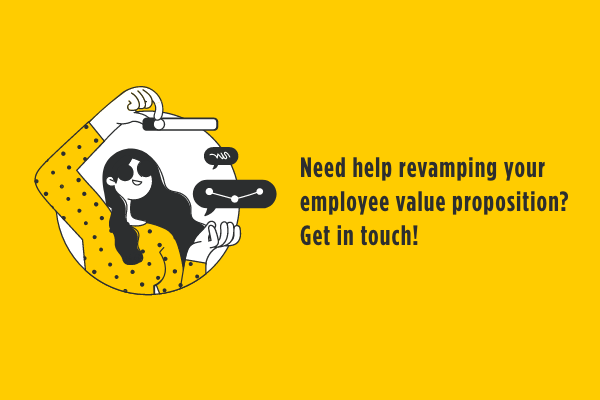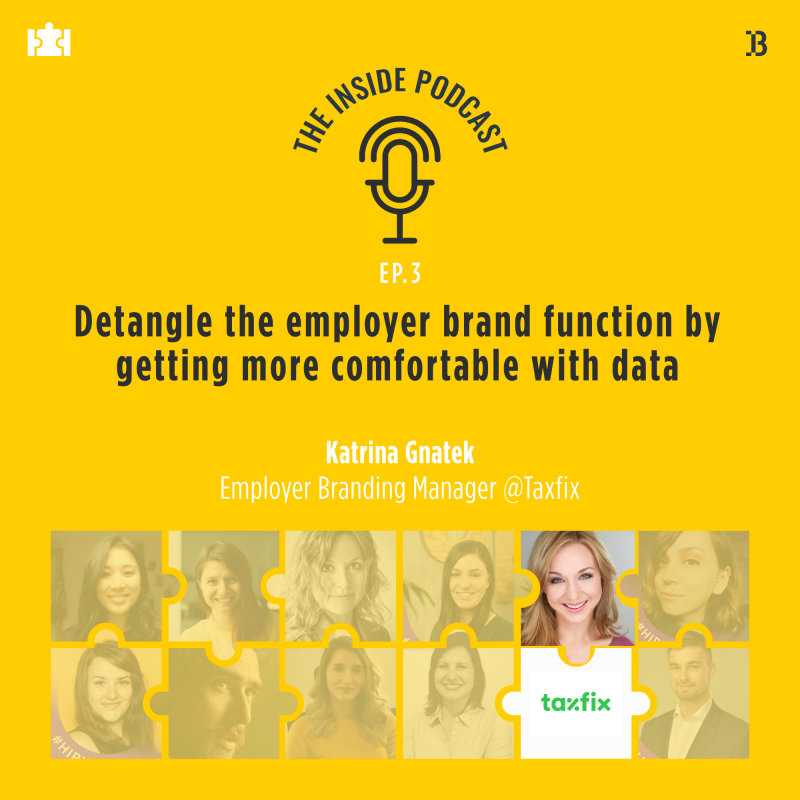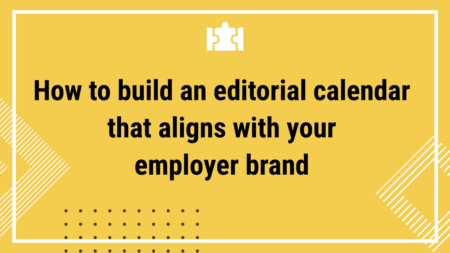Overview
S02Ep.03 of Employer Branding: The Inside Podcast is here! We’ve had the pleasure of speaking with Katrina Gnatek, Employer Branding Manager at Taxfix, and we learned that there’s a lot more to the employer brand function than meets the eye. We talked about the importance of having an EVP, ongoing learning to help refine your EVP, and a lot more. Check it out to find out more!
What you’ll learn by listening
- How an EVP is the pillar of your company culture
- The power of data when refining your EVP
- Insightful tips on employer branding for managers just starting out
- The future of work is people-centric, collaboration-friendly, mental-health friendly
- Prioritizing on employee experience
- The importance of listening to your employees & iterating as you go to succeed
- How the future of work is more people-centric
About the company
Every year millions of people are either filing their taxes in fear or giving up on their tax refund altogether. We’re working on fixing that. Our intuitive app enables anyone, regardless of education or background, to file their taxes with newfound confidence.
Spread across Berlin and Madrid, Team Taxfix is a compassionate group of solution-finders. We speak our minds openly, and with 250+ professionals from over 40 different nationalities, we’re rich in ideas and voices. In four years, we’ve raised $110 million in funding from some of the world’s top investors—Index Ventures, Valar Ventures, Creandum, and Redalpine.
Podcast link
Podcast transcription – Let us detangle the employer brand function!
Georgiana: Hi, everyone! This is Georgiana, and again, you’re listening to Employer Branding: The Inside Podcast. Today I have the pleasure of speaking with yet another employer branding manager. Her name is Katrina Gnatek, employer branding manager of Taxfix here in Berlin. Welcome, Katrina! Thank you so much for accepting my invitation.
Katrina Gnatek: Yeah, I’m thrilled to be here. Thank you so much.
Georgiana: I have to say that I have looked at your LinkedIn profile before recording this podcast. And at first I was, of course, impressed by how neatly all the information is organized; and by how many details you give with regards to each position you occupied. And secondly, I was impressed by the fact that you worked in two companies, which I really appreciate. And those are Taxfix and GetYourGuide. I was thinking, maybe we could go over exactly what your duties revolved around in these two companies. And, of course, what your role entails with Taxfix, what the company does, so please…
Katrina Gnatek: Sure. So a little background on my career thus far. I started out at GetYourGuide as a working student and had the awesome opportunity to work under an employer brand strategist or specialist, excuse me; but he’s also very good at strategy as well.
That was a great way to get comfortable with all the ins and outs of the function in a startup. Because I know the function can look a bit differently depending on the stage of the company. So basically, what I was taking care of there was managing Glassdoor reviews, analyzing candidates survey feedback, supporting with managing and evaluating events that we were a part of, and also drafting social media posts; supporting some research projects, like the EVP research that we were beginning when I was there. After my graduation, I had the chance to transition over to Taxfix.
Taxfix is an app that helps people file their taxes, which I know sounds a bit boring. But we’re actually super passionate about making it accessible for everyone; regardless of education or background to be able to submit their tax return, but also to optimize how much they’re getting back; and make the whole process as smooth and painless as possible.
I joined Taxfix and basically what I’m doing now is I’m running the employer brand function there. We’re currently 300 employees. When I first came in, a big part of the work was redefining how we talk about ourselves on our different channels: our career site, LinkedIn, Facebook, Instagram, as well as Glassdoor; and also defining the target groups that we want to reach and trying to understand what’s important to them; also creating content to speak to those groups.
We do that in sort of a few different formats, like long form, blogs, but also shorter stories that maybe we post on LinkedIn or Instagram. And sometimes we do video projects. Additionally, we do a little bit of recruitment marketing, just sort of like dipping our toes in that. And also just supporting with any sort of talent acquisition pain points to make information accessible and easy to understand for candidates, but also looking at different sort of branding initiatives that can support our recruitment pipelines. I’m reporting on everything that we’re doing, all the key metrics that we gather from our career site or LinkedIn or Instagram and just trying to iterate and improve as we go.

Georgiana: Okay, that’s quite a few.
Katrina Gnatek: I’m doing too much. But yeah, it’s super interesting work for sure.
Georgiana: For sure. And I guess all of them are equally important. But what also attracted my attention when I was reading through your LinkedIn profile, was that how at GetYourGuide, during your time there, you were tasked with supporting work on the employee value proposition, which, in my opinion, the EVP is sort of the pillar of the company culture. It’s supposed to be a centerpiece of every employer branding strategy. I was wondering, maybe you could share a bit of insight into how that process was, how it worked out for you, how it worked out for the company.
Katrina Gnatek: Yeah, absolutely. When I was at GetYourGuide, I was supporting the research for our employee value proposition. And basically, the way that we approached it was by doing qualitative interviews across the company with different employees from different seniority levels, different departments to get a really good idea about what we’re doing great, what we need to do better, what is really speaking to our employees.
And I think it’s interesting to note that the way we structured those interviews was that we looked at sort of the whole scope of the employee journey. So we tried to ask questions that were focused on perhaps the time before they entered into the process with us; then looking at the recruitment process, and then also, once they joined the company; those three different stages. And then the goal of taking all of that qualitative data was to turn it into a quantitative survey that was sent out to the whole company to get real numbers on what was important to your team. That’s sort of how it worked in a nutshell.
And now, we’re trying to recreate that at Taxfix. It’s just super interesting to really get into the nitty gritty of what takes. Your company is special, but also who thrives best in those types of environments.
Georgiana: And would you say that having a carefully drafted employee value proposition or employer value proposition, is something that a company should absolutely take into account? Or is it something that can be delayed up to a certain point in time, or everyone feels that they are ready for it? What’s your take on that?
Katrina Gnatek: Yeah, it’s absolutely important, and will definitely strengthen any strategy that you’re trying to put in place for employer branding. I don’t think you’d find an employer brand manager that would say it’s not. However, I would say that depending on your company size, and the initiatives that you have to prioritize, sometimes that work does get delayed, or it gets done very, like quick and dirty.
And that’s okay, in a sense. And the reason why I would say that is because especially if you’re working in a startup environment, or sort of like a mid-stage company, your EVP is going to develop and mature with you. I think it’s absolutely something that you can’t just do once and call it a day. You can always be looking at different data points that are going to influence the work that you’re doing.
Even on an unlimited budget or limited time, you can always do interviews with your employees, you can always gather data from candidate surveys or analyze Glassdoor reviews, or even like internal people team surveys that measure the engagement of your team. There’s always data to be checking and rechecking and tweaking your EVP as your company grows.
Georgiana: Yes, that’s definitely something to take into account anyway. Katrina, if you were to give three tips to an employer branding manager who’s just starting out, what would they be?
Katrina Gnatek: Sure. It’s a great question. It’s nothing revolutionary, but I would say my first and most important tip is to talk to everyone that you can: internal within your company, or external. And I mean that in the sense of just trying to see how other people do what they do, and how you can take their learnings and apply it to your own work; because the employer brand function touches so many different aspects of branding, of marketing, of employee experience. Just talk to whoever you can. And I’ve been doing that myself speaking with different employer brand managers in Berlin, but also globally. There’s a lot of amazing people you can chat with. Just reach out and see what they say.
My other tip is to stay focused. Something that I’ve definitely tried to do myself is to not try to do everything. And that’s because this role can go in so many different directions; and there’s so many places that you can have an impact on the company, especially when it comes to the story that you’re telling candidates.
I would recommend to just find some key initiatives to focus on and build from there, and don’t take on everything at once. As for my third tip, I would have to say to just get comfortable with data, even just simple sort of, like cost analysis, or gathering qualitative data from candidates that you speak with. Employees can be so powerful when you’re trying to make your strategy, so just make sure you’re collecting and trying to use as much data as you can.

Georgiana: For sure it’s helpful, not to someone who’s just starting out, but also to every employer branding manager out there, as this entire environment and the entire domain of employer branding is so new. Everything can make a huge difference at this point in time.
Katrina Gnatek: Absolutely. Yeah, definitely. And I think I would add, like a bonus tip, based on what you just said, that the function of employer branding is so new and a lot of people don’t understand it. Data will help with that. But it’s just as important to be comfortable with ambiguity. Because there’s a lot of things that you won’t understand at first, so you just have to figure it out as you go.
Georgiana: Yeah, for sure. And Katrina, what would you say the future of work looks like in general? What is it like for you? And of course, what does it look like for Taxfix?
Katrina Gnatek: That’s a super interesting question. I think a lot of people are talking about this now. In my opinion, I would say that the future of work is definitely going to be more human or just more people-centric. I think flexibility is such a big topic right now. But also being remote-friendly, collaboration-friendly, mental-health friendly.
I think we’re all realizing that the employee experience is so important, especially in this past year that we’ve had, but also moving forward. That’s something a lot of companies are trying to look into and plan for. And that’s a big part of the Taxfix plan for the future. Luckily, I think we were in good shape at the start, in terms of our commitment to culture and employee experience.
From a very early stage, we’ve tried to really infuse the values that we have into every touch point for employees. Those values are: understand, deliver, develop, and trust. And you see that in the way that we offer perks for all full time employees like mental health support, flexible working hours; but also in our commitment to our customers.
We had a really nice initiative a few months ago for people that were on Kurzarbeit, or were unemployed in 2020. We offered a free tax filing for them. So I think that we’re already in good shape in terms of our people-centric approach. But just moving forward, we’re really trying to keep our finger on the pulse about what’s important to our team.
That goes into how we’re planning our future office. We’re currently on the lookout for a new space and we want to find a place that’s very collaboration-friendly, but also home office friendly, as well. We really believe that there’s no one size fits all approach to how people like to work. But we’re trying to infuse that into how we design coming back to work whenever that’s safe and possible.
Georgiana: Learning as you go, right?
Katrina Gnatek: Yeah, absolutely. I think that’s something every company should be doing: to sort of learn and listen as we go through this. Nobody knew how to handle a pandemic of this scope. So you really just have to listen to your employees and iterate as you go.
Georgiana: Absolutely. And now Katrina, I’d like to ask you a question that I ask all my guests. And that is, if you can share with us a resource, a book or an article that’s been really helpful to you?
Katrina Gnatek: Oh, okay. Um, there’s a lot out there, for sure. I think there’s a lot of incredible online resources for people that are starting out, like Rally Recruitment Marketing, or the talent brand Alliance group on Facebook. Those are amazing places where you can ask questions and find resources. Personally, I’ve started reading Give and Get Employer Branding, which was recommended to me by another employer brand manager in Berlin. A big shout out to Andrew for that suggestion.
I would say those are probably my favorites right now. But also, on a weird side note, I read a lot of academic journals about employer brand theory and brand theory. When I was first starting out, not necessarily just for fun, but I was working on a thesis project related to employer branding. However, having those core frameworks, and the theoretical knowledge was super helpful. I would say, go on Google Scholar and do a search for employer brand articles. And there’s some really excellent research studies there. So that’s what I would say.
Georgiana: I totally second that. Absolutely. I got many of the premises even for these podcasts and for the content that we publish on our employer branding website from scholarly articles, so absolutely, yes. If you want to go one step further, definitely look at them as well. Katrina, what are you most excited about at this point in time, career wise?
Katrina Gnatek: I’m excited for everything. I would say I’m just learning about this field. Just being curious because it’s probably pretty easy to get overwhelmed by the scope of employer branding. But approaching it from a place of curiosity and learning is super exciting. And for my personal growth right now, Taxfix is going through a scaling phase and there’s some really exciting things coming down the line for our product and for our team. So I’m super excited to be a part of that, and to help build the function within the company.
Georgiana: That sounds really great and exciting. I’m actually getting to my last question. And the question is the following: if you had the ideal budget, what would you do in terms of employer branding at Taxfix? Or, you know, at any other company?
Katrina Gnatek: That’s always the big question, right? Cuz we’re always trying to, like stretch a budget and make a lot out of a little. I would love to be able to invest in a bigger team. I guess we would need sort of like a large, ongoing budget for that. But yeah, I think it would be amazing to have additional specialized support, either in marketing or event planning to support my function, and take employer branding to even greater heights.
A lot of times I think employer brand managers have to be sort of a jack of all trades in smaller companies, which works to a certain point. But yeah, having the ability to specialize in different functions would be the dream someday down the line.
Georgiana: For sure, I think the smaller the company, the more difficult it is to even have this role in place. If you look at companies with 80, or 90 or 100 employees, I think the person managing HR, and the person managing marketing, or sometimes even, only one of them are going to also handle employer branding.
Katrina Gnatek: Exactly.
Georgiana: I can totally understand the struggle and the suggestion for extended teams and various roles integrated within the employer branding team. Super! Katrina, this was really nice. It was nice talking to you. It was a lot of fun finding out about your work at Taxfix. And I thank you so much for accepting my invitation. We’ll be in touch very soon.
Katrina Gnatek: Thank you. It was my pleasure.
For more podcasts and content on employer branding-related things, check us out on employerbranding.tech. You can also find our podcasts on Spotify and Apple Podcasts. Until the next time! Stay tuned! Bye!







